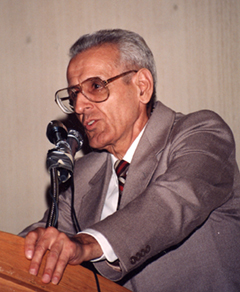 Dr. Jack Kevorkian, 83, died June 3, 2011, of a pulmonary thrombosis at a hospital in Royal Oak, Mich.
Dr. Jack Kevorkian, 83, died June 3, 2011, of a pulmonary thrombosis at a hospital in Royal Oak, Mich.
Kevorkian was born May 26, 1928, to Armenian immigrants in Pontiac, Mich. He earned his M.D. from the University of Michigan in 1952 and later specialized in pathology. He wrote a series of articles in the 1980s detailing his reasoning on the ethics of euthanasia. His first known involvement in a physician-assisted suicide occurred in 1990, after which the state of Michigan revoked his medical license.
Believing in the right to die, Kevorkian assisted in the pain-free suicides of more than 130 people with terminal illnesses. He spent eight years in prison after being convicted of second-degree murder in the death of a 52-year-old man with Lou Gehrig’s disease. He was released on parole, his health broken, in 2007.
In his 1990 keynote address at FFRF’s annual convention in Ann Arbor, Mich., Kevorkian told convention-goers: “Religion is telling law what to do, and law is telling doctors what to do. Religion dictates to law, and law dictates to ethics. No wonder we have problems. That’s insanity!”
It was his first speech on the topic to a nonmedical group. He detailed the history of euthanasia and abortion as standard procedures in the secular medical world until Christianity injected its influence on the profession several centuries later.
After his release from prison, Kevorkian told The New York Times that his harshest critics were “religious fanatics or nuts.”
In 2009, he told FOX host Neil Cavuto that his parents “never foisted religion on me. My father never was religious much. My mother was the old country religion, but not fanatic. But I never believed in God. I never believed in Santa Claus.”
Standing beside her uncle’s flag-draped casket at a public memorial service at White Chapel Cemetery, Ava Janus told mourners that Kevorkian simply wanted the gravely ill to have a choice about how they would die.
Kevorkian was a lifelong bachelor. His friend Ruth Holmes said his motto was, “The more you are the less you need.”
“Few men are willing to brave the wrath of society,” Holmes said. “That was our dear friend, Jack Kevorkian.”
The media and critics taunted Kevorkian as “Dr. Death,” trying to paint him as a macabre person instead of a progressive medical reformer.
Anne Nicol Gaylor, FFRF president emerita, said, “We greatly admired Dr. Kevorkian, one of freethought’s heroes, who braved the wrath of the church, social orthodoxy and the state in order to ease unnecessary human suffering.”
“It should be a human right to be able to painlessly end one’s own life, surrounded by loved ones, when the time comes,” Gaylor said. “That was Dr. Kevorkian’s object. The main opposition to death with dignity is the church.”
Photo: Brent Nicastro

